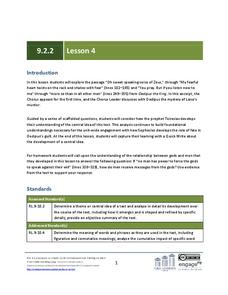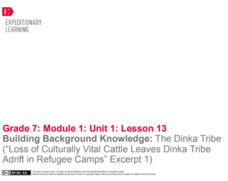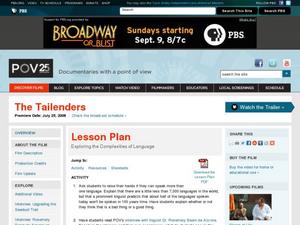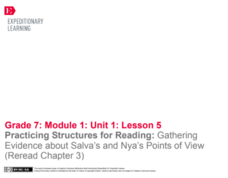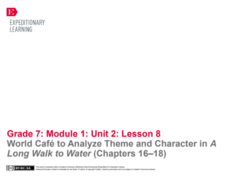EngageNY
Writing an Argument Essay: Evaluating the Model and Crafting a Claim (Chapter 28, Including Synthesis of Scenes in Previous Chapters)
Scholars use the model essay from the previous instructional activity to create their own argumentative essays. Readers make a claim about Atticus defending Tom in To Kill A Mockingbird. They then use graphic organizers to develop and...
EngageNY
Grade 9 ELA Module 2, Unit 2, Lesson 4
The concept of sight, whether it's a lack of sight or abundant sight of the future, plays a vital role in Sophocle's Oedipus the King. Develop your ninth graders' literary vision with a lesson that connects the prophecy of Teiresias to...
EngageNY
Building Background Knowledge: The Dinka Tribe (“Loss of Culturally Vital Cattle Leaves Dinka Tribe Adrift in Refugee Camps” Excerpt 1)
Text annotations help readers track essential ideas. Pupils continue reading and annotating an informational article about Sudanese tribes, connecting it with A Long Walk to Water by Linda Sue Park. They also begin writing about their...
EngageNY
Mid-Unit Assessment: Justification for Character and Scene Selection
When it comes to love and midsummer nights, confessions are tricky. Learners place themselves in the shoes of a character from William Shakespeare's A Midsummer Night's Dream and explain how a character manipulated another character in...
EngageNY
Analyzing Poems from Inside Out and Back Again to Develop Criteria for an Effective Poem
Scholars analyze a model poem to help guide their poetry writing. They use Think-Pair-Share to discuss word choice and meaning in "Papaya Tree" and "Wet and Crying." To finish, they use their discussions to collect evidence on what makes...
Literacy Design Collaborative
Analyzing Language through Dialogue and Internal Monologue in "The Scarlet Ibis"
James Hurst's short story "The Scarlet Ibis" provides eighth graders with an opportunity to sharpen their literary analysis skills. After a close reading of the text, class members highlight and annotate parts of the dialogue and...
EngageNY
Continued Close Reading of Bullfrog at Magnolia Circle: Text-Dependent Questions and Vivid Words and Phrases
As 3rd graders continue reading Bullfrog at Magnolia Circle, they focus on the concepts of predator and prey in the fifth lesson plan of this unit. Scholars further develop their ability to answer questions using evidence from the text...
EngageNY
Continued Close Reading of Bullfrog at Magnolia Circle: Text-Dependent Questions and Vivid Words and Phrases
In the third activity from this unit based on the book Bullfrog at Magnolia Circle, learners focus on using specific details from the text-to-answer questions about the habitat of bullfrogs. While reading the text, young scholars are...
Curated OER
Writing Skills: Fables
Use fables as a fun way for English Language Learners to gain confidence and fluency in their reading and speaking skills. After reading a fable in class, they retell their story to a group of their peers. When this jigsaw activity is...
Prestwick House
New (March 2016) SAT Writing and Language Test Practice
Prepare class members for the SAT Writing and Language exam with a practice test that prepares students for the types of questions and the kind of language used in the exam. Test takers must select the best way to fix poorly constructed...
Curated OER
Looking Back - An Art/English/History Interdisciplinary Unit
Students research historical events of the past century to recognize that society impacts the themes within art and literature. They then interview an individual to develop a biographical narrative, a collage and finally an oral...
EngageNY
Analyzing Language in a Speech: The Montgomery Bus Boycott Speech
Scholars analyze the use of active and passive voice in The Montgomery Bus Boycott speech and refer to an Active and Passive Sentences handout while viewing the text. Pairs of learners then work together to identify passive and active...
EngageNY
Analyzing Main Ideas and Details: Why Care about Water?
Pay attention to details! After completing text-dependent questions about paragraphs 10-12 of "Water is Life," scholars view the video "Why Care about Water. "They view the video three times and use a Main Idea and Details note-catcher...
EngageNY
Main Ideas in Informational Text: Analyzing a Firsthand Human Rights Account
Although this is part of a series, lesson plan nine has your class take a break from their close study of the Universal Declaration of Human Rights (UDHR) text to read the firsthand account “Teaching Nepalis to Read, Plant, and Vote” by...
EngageNY
Main Ideas in Informational Text: Analyzing a Firsthand Human Rights Account for Connections to Specific Articles of the UDHR
Lesson 10 in a series of human rights lessons focuses on the skills of finding evidence and summarizing. Your young readers work to compare the two texts they have read in this unit: the Universal Declaration of Human Rights...
Scholastic
Outlining Main Ideas and Details
Practice outlining and evaluating expository writing in this lesson. After discussing main ideas and seeing examples, young writers go through a sample outline and discuss the way to properly format a piece of writing. They then create...
EngageNY
Connecting Ideas in Primary and Secondary Sources: What Led to the Attack on Pearl Harbor?
Let's make some sense of those thoughts! Scholars continue thinking about the different perspectives on Pearl Harbor. They analyze quotes from War in the Pacific, Day of Infamy, and Fourteen-Part Message. Readers tape each quote to chart...
Curated OER
Exploring the Complexities of Language
An interview with Dr. Rosemary Beam de Azcona launches a study of the complexities of language and how meaning changes across languages and cultures. The investigation continues as class members view clips of the film, The Tailenders,...
Curated OER
Moral Development in Camus' The Stranger
“In the depth of winter, I finally learned that within me there lay an invincible summer.” Readers of The Stranger rate Mersault’s moral development (or lack thereof) using Kohlberg’s Theory of Moral Development scale. Using specific...
EngageNY
Practicing Structures for Reading: Gathering Evidence about Salva’s and Nya’s Points of View (Reread Chapter 3)
How does an author develop and contrast character points of view in a work of literature? Using a graphic organizer, readers continue gathering evidence about character point of view from Linda Sue Park's A Long Walk to Water. Next,...
EngageNY
World Café to Analyze Theme and Character in A Long Walk to Water (Chapters 16–18)
Here comes a surprise ending! Readers discuss their thoughts about the ending of A Long Walk to Water by answering probing questions. They participate in a World Café where they work in triads to complete a chart and a prompt during...
EngageNY
Close Reading: Excerpt 2 of “The Digital Revolution and the Adolescent Brain Evolution”
Help scholars comprehend a challenging text. Using the resource, pupils read excerpts from an article about the digital revolution and adolescent brain development. As they read, they answer text-dependent questions and complete a close...
EngageNY
Close Reading: Excerpt 5 of “The Digital Revolution and the Adolescent Brain Evolution”
Class members consider how technology affects social interactions as they continue reading an article about the digital revolution and adolescent brain development. Then, working in pairs, scholars answer text-dependent questions and...
EngageNY
Reading for Gist and Answering Text-Dependent Questions: Chapter 5 of World without Fish
Discover the rules of fishing. Pupils read chapter five of World without Fish to discover ideas about the rules and laws of fishing. They use sticky notes to annotate text as they read about fishing in other countries. They focus on the...



